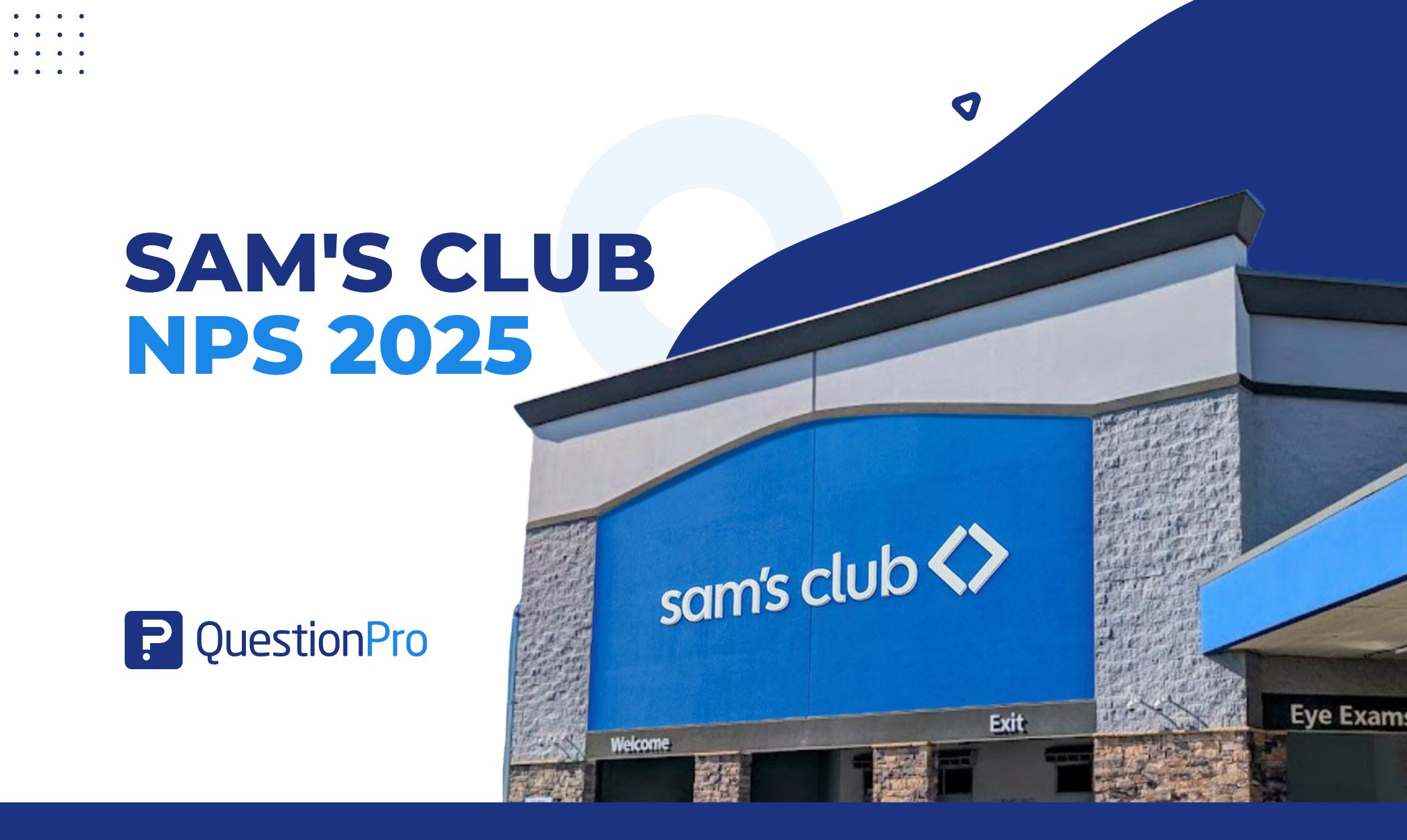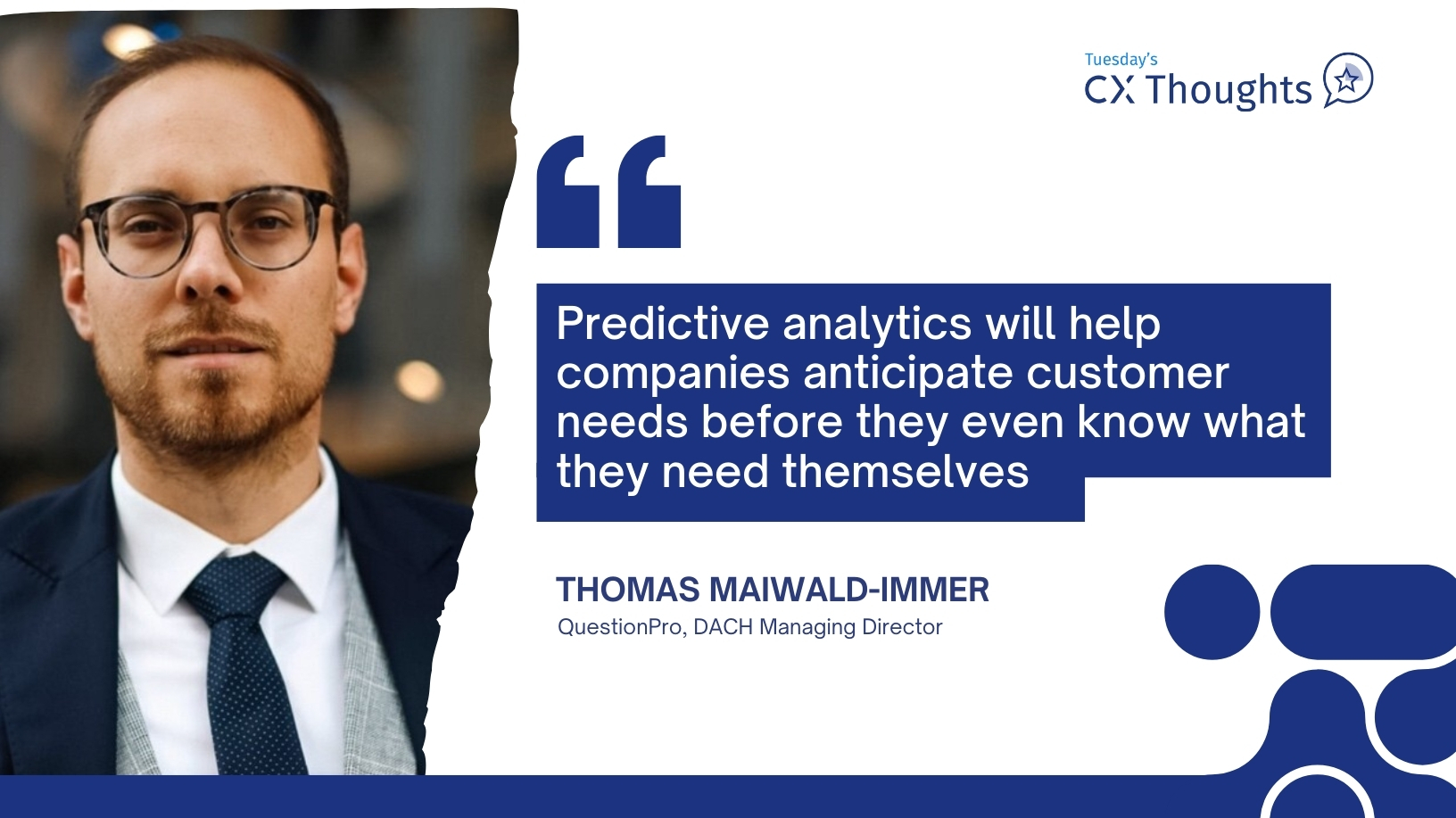
Making the right business decisions in the B2B market is not easy. B2B market research helps businesses understand industry trends, customer needs, and market dynamics.
How do you know what your customers need? What are your competitors doing? Where should you focus your marketing efforts? Instead of guessing, companies use data to shape their strategies, improve products, and gain a competitive edge.
In this guide, we’ll explore what B2B market research is, why it’s essential, and how you can conduct it effectively to drive success.
What is B2B Market Research?
B2B market research (Business-to-Business) is the process of gathering information about businesses, industries, and customers to make informed decisions. Unlike B2C (Business-to-Consumer)market research, which focuses on individual buyers, B2B research is all about understanding what companies need, how they make purchasing decisions, and what boosts their success.
B2B market research helps businesses stay ahead of the competition by understanding their customers and industry better. With the right research, companies can create better strategies, improve products, and build stronger relationships with other businesses.
Learn More: What is Market Research? Methods, Types & Examples.
How B2B Market Research Helps Businesses?
B2B market research helps businesses make smarter decisions by providing valuable data about their industry, competitors, and customers. Instead of guessing what works, companies can use real data to improve their strategies and grow efficiently.
- Identifies the Right Customers: B2B market research helps you understand who your ideal customers are, what they need, and how you can solve their problems.
- Improves Marketing Strategies: With research, businesses can create targeted marketing campaigns that speak directly to their audience. This means less wasted effort and better customer engagement with potential customers.
- Keeps You Ahead of Competitors: B2B research helps businesses analyze competitor strategies, spot market trends, and find opportunities to stand out.
- Supports Better Product Development: By understanding customer needs, businesses can create products or services that truly add value. This reduces the risk of launching something that doesn’t meet market demand.
- Boosts Sales and Revenue: When you know your market well, it’s easier to sell. Research helps businesses refine their sales strategies, find new opportunities, and build stronger customer relationships.
Types of B2B Market Research Data
B2B market research helps businesses make informed decisions by gathering and analyzing different types of data. Understanding these data types ensures companies get a complete view of their market, competitors, and customers. Here are the four main types:
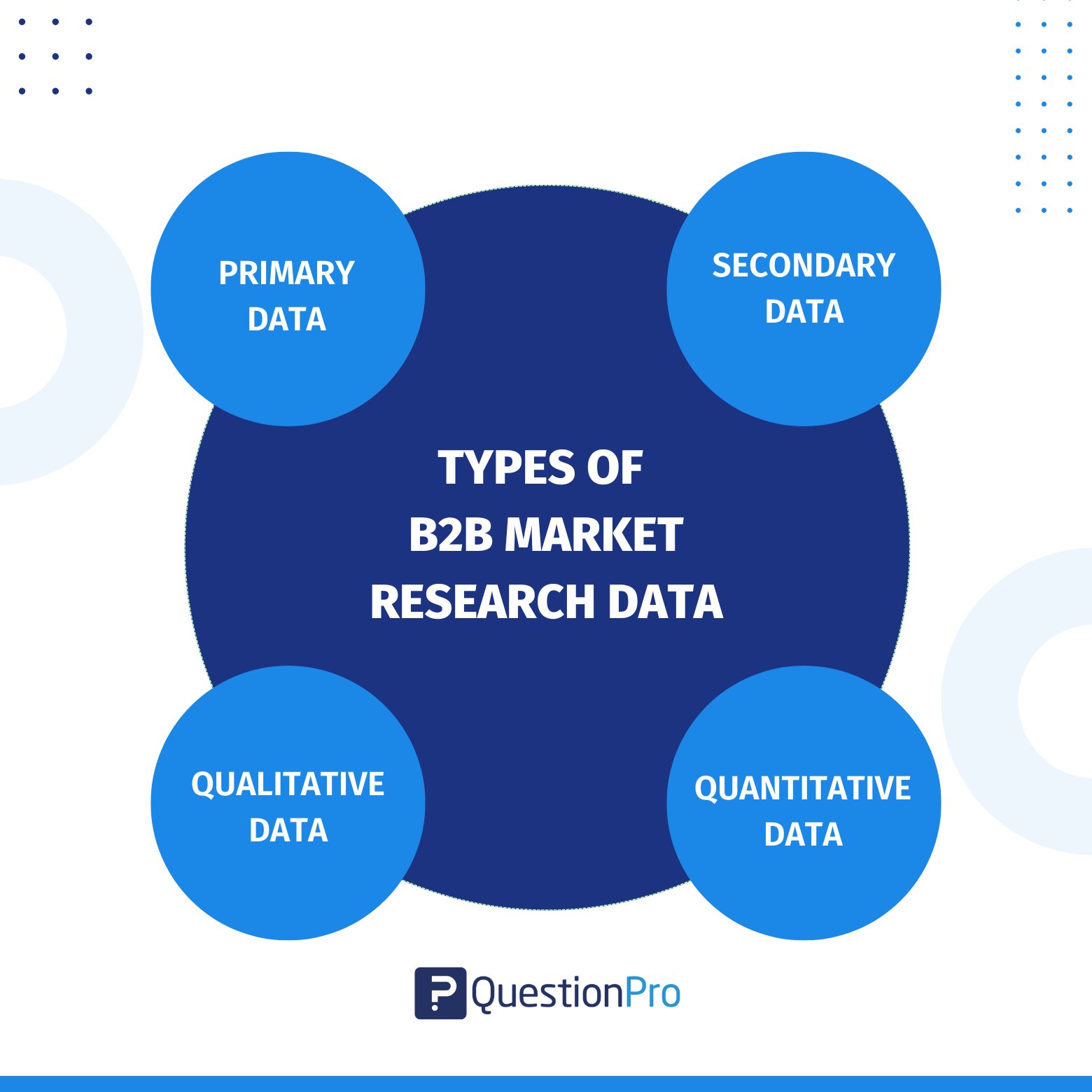
1. Primary Data – Directly Collected Information
Primary data is fresh, firsthand information collected specifically for research purposes. This type of data is customized to a company’s needs and provides unique insights directly from target businesses, decision-makers, and industry experts. Since it is collected firsthand, it is highly relevant, but can also be time-consuming and costly.
Examples:
- Surveys
- Interviews
- Focus Groups
- Product Testing
Primary data offers direct and specific insights that help businesses develop effective strategies.
2. Secondary Data – Existing Information
Secondary data or secondary research refers to information that has already been collected by other sources. It is an excellent starting point for research, as it provides a broad overview of the industry, competitors, and market trends. This research is often easier and cheaper to access than primary research, but it may not always be up-to-date or specific to a business’s exact needs.
Examples:
- Market Research Reports & Market Studies
- Competitor Analysis
- Government Data & Statistics
- Academic Research & White Papers
Secondary data helps businesses understand overall market conditions and industry benchmarks without the effort of direct data collection.
3. Qualitative Data – Thoughts & Opinions
Qualitative research focuses on understanding the motivations, emotions, and reasoning behind business decisions. Unlike numerical data, qualitative research insights provide context and deeper understanding. This type of data is subjective and often collected through open-ended conversations.
Examples:
- In-depth Interviews
- Customer Feedback & Testimonials
- Case Studies
- Social Media & Forum Discussions
Qualitative data helps businesses understand the “why” behind purchasing decisions, uncovering unmet needs and opportunities.
4. Quantitative Data – Numbers & Trends
Quantitative data is all about numbers and measurable facts. It helps businesses analyze trends, track performance, and make data-driven decisions. Quantitative research is objective and often presented in charts, graphs, or statistics.
Examples:
- Sales & Revenue Data
- Market Share Analysis
- Survey Ratings & Polls
- Website & Social Media Analytics
Quantitative data provides clear, objective insights that help businesses measure success and identify areas for improvement.
B2B Market Research Methods
B2B market research helps businesses understand their industry, competitors, and customers so they can make smarter decisions. Companies use different research methods to gather the right information. Here are the most effective ones:
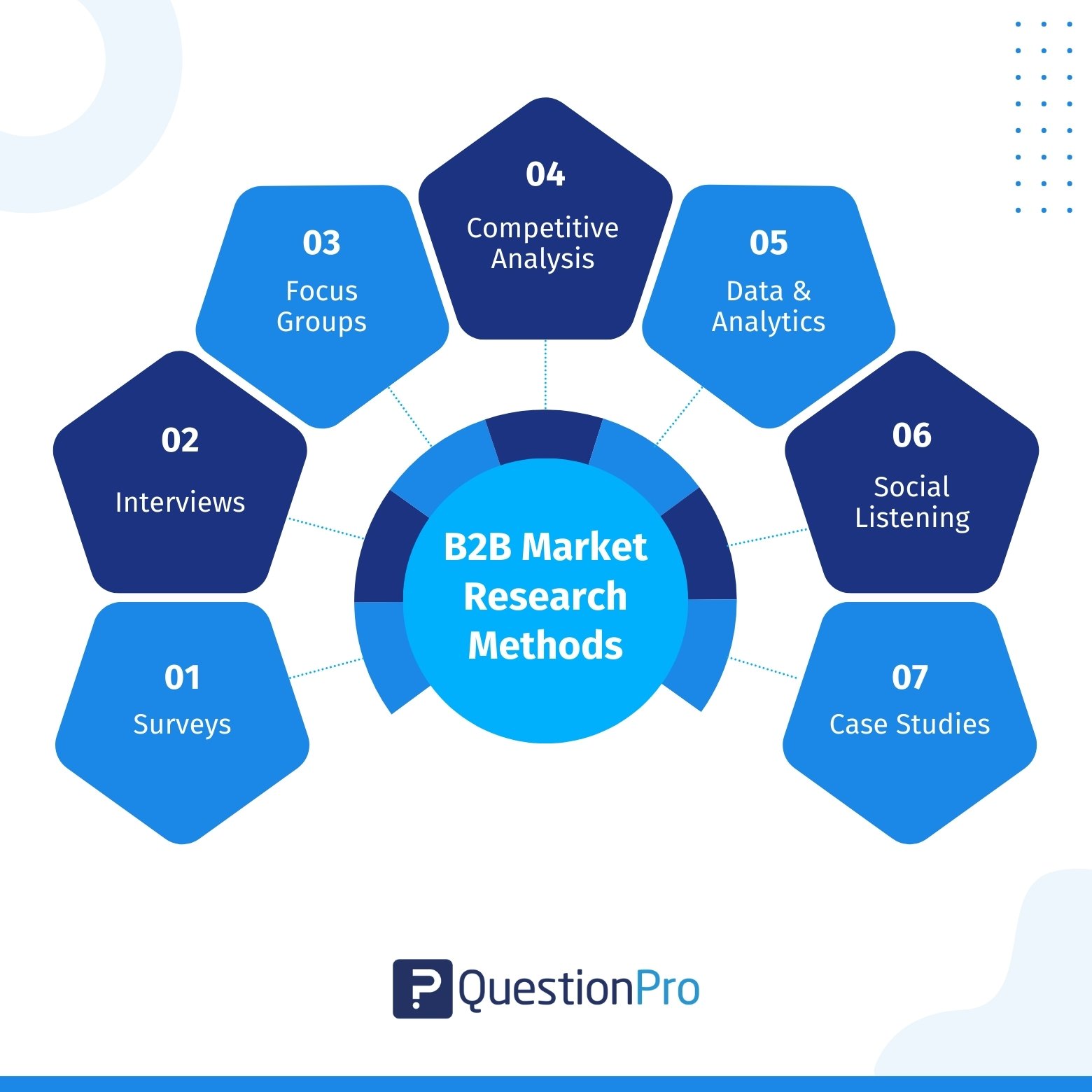
- Surveys
Surveys are one of the easiest ways to collect information from businesses. They help companies understand customer needs, preferences, and satisfaction levels. Surveys can be conducted online, via email, or over the phone.
- Interviews
Interviews involve one-on-one conversations with industry experts, customers, or business decision-makers. They provide detailed insights into customer pain points, needs, and behaviors.
- Focus Groups
A focus group brings together a small group of professionals from a target market to discuss a product, service, or trend. These sessions offer real-time feedback and uncover new ideas.
- Competitive Analysis
Competitive analysis involves researching competitors to see what they’re doing well and where they’re struggling. This helps businesses find gaps in the market and create better sales and marketing strategies.
- Data & Analytics
Businesses collect and analyze data from different sources, such as website traffic, customer behavior, and sales performance. This helps identify trends and predict future market needs.
- Social Listening
Social listening tracks what businesses are saying about a brand, industry, or competitors on social media, forums, and review sites. It helps companies understand market sentiment and respond quickly.
- Case Studies
Case studies analyze past business experiences to understand what works and what doesn’t. They help companies see real-life applications of products and services.
How to Use Your B2B Market Research?
Collecting data is just the first step—the real impact comes from using that research to make better business decisions. Here’s how you can effectively apply your B2B market research to grow your business and stay ahead of the competition.
Improve Your Products or Services
Understanding what your customers need is crucial for offering better products and services. Your research can highlight pain points, feature requests, or unmet needs that you can address.
How to Use It:
- Analyze customer feedback to refine existing products.
- Identify gaps in the market and develop new solutions.
- Use competitor analysis to differentiate your offerings.
Strengthen Your Marketing Strategy
Market research helps you craft targeted marketing campaigns that resonate with your audience. You can determine which channels work best, what messaging appeals to buyers, and how they prefer to engage with brands.
How to Use It:
- Identify where your audience spends time (LinkedIn, industry forums, etc.).
- Create content that addresses common challenges or pain points.
- Test different marketing messages to see what performs best.
Optimize Your Pricing Strategy
Pricing plays a major role in attracting and retaining B2B customers. Research can help you understand how much businesses are willing to pay and how your pricing compares to competitors.
How to Use It:
- Conduct a competitor pricing analysis to position yourself effectively.
- Use customer feedback to determine whether your pricing aligns with value perception.
- Test different pricing models (subscription vs. one-time payment) to see what works best.
Enhance Your Sales Approach
Sales teams can use market research to personalize their outreach, address objections, and close deals more effectively.
How to Use It:
- Identify common customer concerns and prepare solutions.
- Understand the decision-making process in different industries.
Stay Ahead of Competitors
Competitor research helps you see where you stand in the market and what you can do differently to gain a competitive edge.
How to Use It:
- Identify your competitors’ strengths and weaknesses.
- Look for underserved customer needs that you can address.
- Differentiate your brand through unique offerings or better customer service.
Make Smarter Business Decisions
Market research minimizes risks by providing data-driven insights for strategic decisions like expansion, partnerships, or product launches.
How to Use It:
- Validate demand before launching a new product or service.
- Assess new markets before expanding into different regions.
- Align business decisions with industry trends and customer expectations.
How QuestionPro Helps you in Creating B2B Market Research?
B2B market research is essential for businesses to understand their target audience, competitors, and industry trends. QuestionPro provides an excellent platform that simplifies and enhances the research process. Here’s how QuestionPro can help:
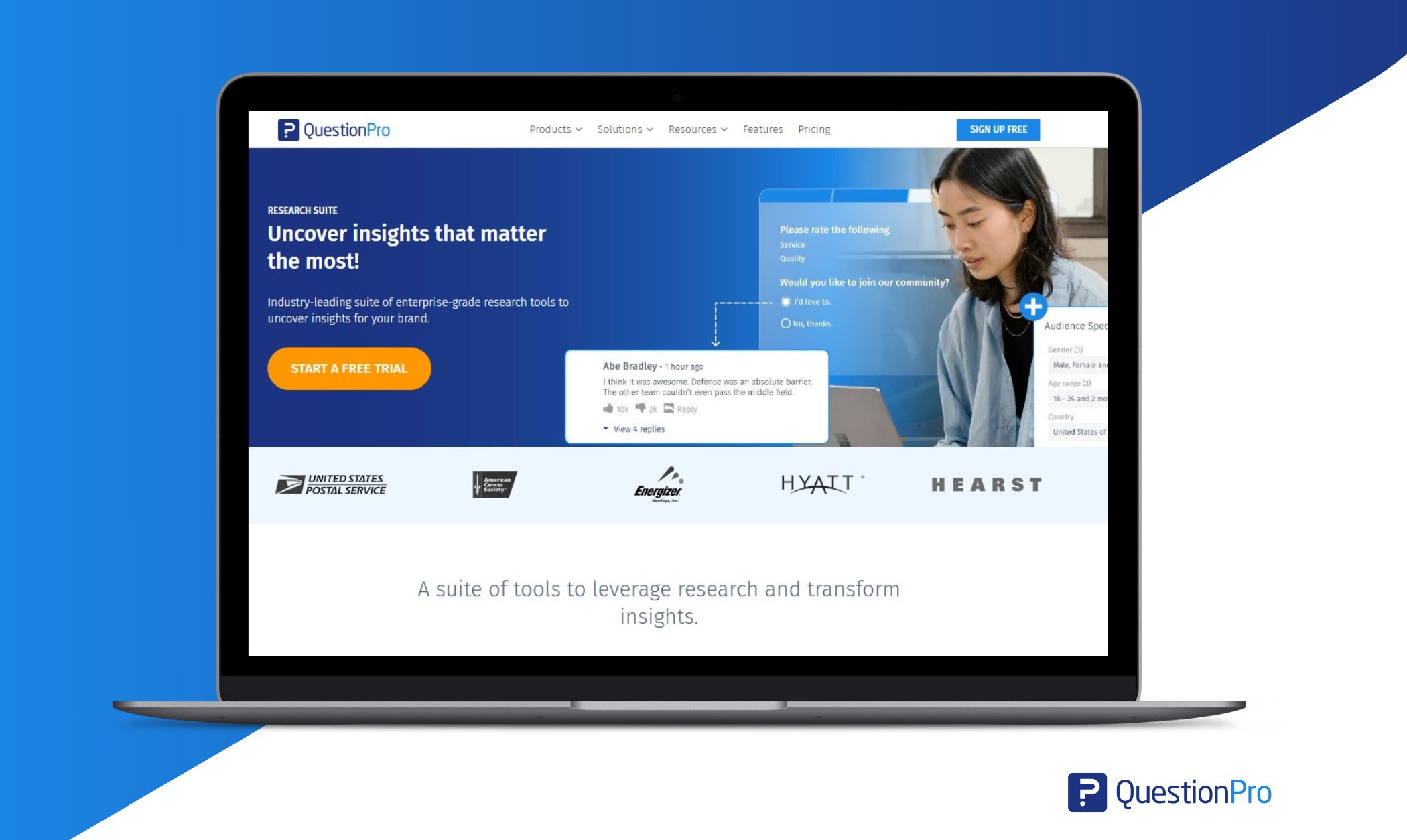
Easy Survey Creation
QuestionPro offers a user-friendly survey builder that allows businesses to create professional and engaging surveys. It includes:
- Pre-built survey templates for B2B research.
- Various question types, including multiple-choice, ranking, and open-ended questions.
- Advanced logic and branching to create personalized survey experiences.
Advanced Targeting & Audience Reach
Reaching the right audience is critical in B2B market research. QuestionPro helps businesses identify and engage their target market through email surveys for direct responses, social media and website-embedded surveys, and access to global respondent panels for niche industries.
Competitive Analysis & Benchmarking
Understanding how your business compares to competitors is crucial. QuestionPro helps in:
- Conducting competitor surveys.
- Benchmarking your business against industry standards.
Example: A consulting firm uses QuestionPro to compare client satisfaction scores with competitors.
Actionable Insights for Decision-Making
The ultimate goal of B2B market research is to boost business growth. With QuestionPro, businesses can:
- Identify new market opportunities and improve product development strategies.
Conclusion
B2B market research is essential for businesses looking to grow, innovate, and make informed decisions. By following a structured approach such as setting goals, identifying audiences, using the right methods, analyzing data, and applying insights, you can conduct effective market research.
Need an efficient way to conduct B2B market research? Try QuestionPro and unlock valuable business insights today!
Frequently Asked Questions(FAQs)
Answer: B2B market research is the process of gathering and analyzing data about businesses, their needs, and buying behaviors to support informed decision-making, unlike B2C research, which focuses on individual consumers.
Answer: The 4 types of B2B market research data are:
1. Primary Data – Directly collected information
2. Secondary Data – Existing information
3. Qualitative Data – Thoughts & opinions
4. Quantitative Data – Numbers & trends
Answer: B2B market research provides data-driven insights to help businesses identify their ideal customers, refine marketing strategies, stay ahead of competitors, develop better products, and boost sales.
Answer: Yes! QuestionPro helps you do B2B market research with an easy-to-use survey builder with pre-built templates and advanced logic. This allows you to target through email, social media, and global panels. It also supports competitive analysis and benchmarking to get insights to find opportunities and grow your business.
Answer: B2B market research methods include surveys, interviews, focus groups, competitive analysis, data & analytics, social listening, and case studies. These help businesses gather insights on customers, competitors, and industry trends to make informed decisions.




